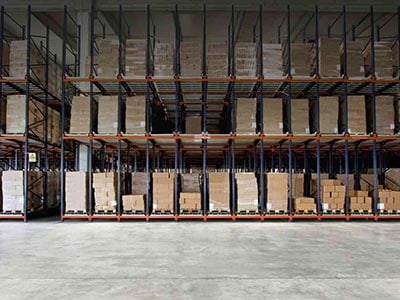LTL Freight Shipping Quotes: Fast, Free, Affordable
Less than truckload (LTL) is an efficient and affordable way for businesses to ship pallets, crates, and more. However, obtaining LTL freight quotes can often be a hassle. Business owners, shipping managers, and warehouse workers spend hours searching many different freight rate websites to find the perfect price. Let uShip do the heavy lifting for you. We offer many tools and services to help your business save time and money.
uShip’s marketplace makes it easy to find the best shipping options for both your LTL freight needs and your budget. Create your listing with your needs and be as detailed as possible. Once you complete your listing, the freight shipping calculator will provide instant LTL rates. You can accept one of those rates or you can take your freight shipment to auction. There, you’ll get LTL quotes from transport specialists as they bid for your business.
Benefits of LTL Freight Shipping with uShip
uShip is an online shipping marketplace that connects shippers to carriers with empty trailer space. As a result, businesses receive the benefit of low-cost LTL shipping rates. Furthermore, uShip has strong relationships with some of the best less than truckload companies in the industry which results in extreme savings. Other benefits include:
- Compare Freight Quotes in One Place: uShip is your one-stop shop for obtaining LTL freight rates. uShip provides quotes from 30+ LTL carriers at once with just a few clicks. This means no more signing into each carrier’s website to compare quotes.
- Invoice Audits: Billing adjustments, sometimes called rebills, are charges that are applied to your invoice for additional services not included in your original quote. We proactively audit each and every invoice for accuracy. If we notice any discrepancies, we reach out to you with more information, including how to dispute the charges.
- Protection Options: Less than truckload carriers are required to carry limited liability insurance. This type of insurance does not cover the entire value of your freight as it only pays up to a few dollars a pound. For example, if your freight is damaged beyond repair and weighs 50 pounds, you may only receive $100 for the damage. For this reason, uShip offers additional protection for select shipments.
- Customer Support: Ease your mind knowing that you have an experienced freight team backing you at all times. We are easily reachable by phone or email to answer any questions or solve any complex problems. When it comes to world-class customer service, uShip delivers.

What is LTL Shipping?
LTL shipping is used for transporting small freight that does not require the use of an entire trailer. Pallets, crates, bundles, and other types of freight from many businesses are combined together to create a full truckload shipment.
These separate shipments are managed via a hub and spoke system, comparable to the way air transportation works – LTL drivers will pick up freight from local businesses and then take it back to a terminal to be sorted and placed on the appropriate trailer for delivery. The freight might be moved and sorted many times throughout its journey. The meaning of LTL shipping can be further explored by reading our guide What is LTL.
Why LTL Freight?
Shipping your freight though LTL offers many benefits that help your business succeed, such as:
- Reduced Cost: The biggest benefit of using LTL is the cost. Since you are sharing space with other businesses, you only pay for the portion of the trailer your freight occupies.
- Environmentally Friendly: The importance of becoming a green business is increasing. LTL freight helps you take a step in the right direction by reducing emissions.
- Minimizes Risks: Since packages are handled more frequently with increased stops, freight shippers are encouraged to load their cargo onto sturdy pallets and into durable crates. These protect the shipment from wear, other freight, and loss of individual packages.
- Easy Tracking: Many carriers will provide real-time tracking that include stop-offs, pick-ups, and delivery. If you are shipping with multiple carriers, uShip offers a free portal to track your shipments all in one place.
- Service Options: The vast majority of LTL carriers offer many services including notifications, inside pick-up and delivery, lift gate, special handling, and more.
When to Use Less Than Truckload
As a rule of thumb, if your freight is on a pallet or in a crate, you can ship it LTL. However, each carrier has its own restrictions on commodities. If you are unsure about your cargo, be sure to check the LTL freight carrier’s rules tariff for more information. In order to determine if LTL freight shipping is right for you, ask yourself the following questions:
- Is my freight within size limits?
- Am I, or an agent, available to load and unload the shipment?
- Can I consolidate and palletize or crate my shipment?
- Am I comfortable sharing trailer space with other freight shipments?
- Do I understand the timeline restrictions of LTL freight?

LTL Freight Carriers
When shipping less than truckload freight, there are three types of carriers to choose from: local, regional, and national. Each type of carrier comes with its own set of advantages and disadvantages. For the best experience, compare your needs against each carrier type.
Local Carriers usually operate a small fleet of trucks to serve an area up to a radius of 100 miles within a major metropolitan commercial zone. These types of carriers are best for last-mile delivery and personalized services. Disadvantages include slower delivery times, higher rates, and poor technology.
Regional carriers serve different geographic sections of the United States. They have more trucks on the road as opposed to local carriers. As a result, regional carriers are able to offer specialized services and faster transit times. Furthermore, regional LTL carriers also act as partners for national carriers to fill in coverage gaps.
National LTL Carriers are able to offer freight services to all 50 states. That said, some carriers limit their services to the lower 48. They work through a complex system of national terminals and are able to pick up and deliver freight anywhere in the United States. Benefits include competitive rates, better technology, and coverage. uShip’s carrier base is primarily made up of the top national LTL carriers.
LTL Freight Carriers
When shipping less than truckload freight, there are three types of carriers to choose from: local, regional, and national. Each type of carrier comes with its own set of advantages and disadvantages. For the best experience, compare your needs against each carrier type.
Local Carriers usually operate a small fleet of trucks to serve an area up to a radius of 100 miles within a major metropolitan commercial zone. These types of carriers are best for last-mile delivery and personalized services. Disadvantages include slower delivery times, higher rates, and poor technology.
Regional carriers serve different geographic sections of the United States. They have more trucks on the road as opposed to local carriers. As a result, regional carriers are able to offer specialized services and faster transit times. Furthermore, regional LTL carriers also act as partners for national carriers to fill in coverage gaps.
National LTL Carriers are able to offer freight services to all 50 states. That said, some carriers limit their services to the lower 48. They work through a complex system of national terminals and are able to pick up and deliver freight anywhere in the United States. Benefits include competitive rates, better technology, and coverage. uShip’s carrier base is primarily made up of the top national LTL carriers.

LTL Shipping Services
Less than truckload (LTL) carriers offer a variety of useful service options that allow you to customize your shipment based on your requirements. Common services include:
- Liftgate: Used when there is not a loading dock or forklift available to load or unload freight.
- Limited access pickup and delivery: Required when the location is limited access for a carrier, such as a church, school, home business, strip mall, rural location, trade show, or government location.
- Inside pickup and delivery: Applies anytime an LTL carrier enters a building to obtain or unload cargo.
- Expedited: Available if you need your goods to arrive at their destination faster than the quoted amount of time.
- Lumper Services: A lumper fee is added when a third-party service is used to load or unload pallets from a trailer. This is typical for a grocery store.
- Detention: If the driver is delayed for any reason due to your actions, you will be charged per minute the driver waits.
- Storage: A fee assessed when you need the shipping company to hold your freight for an extended amount of time.

LTL Shipping Cost
Less than truckload carriers take into account many factors when calculating LTL freight costs. As previously mentioned, freight classification is one of the most important factors. Other factors that affect the cost to ship freight via ltl are:
- Distance: Rates increase the further the commercial freight needs to be delivered, the carrier’s primary region, and if a second carrier needs to be brought in.
- Fuel surcharge: Rates are calculated using several factors: gas prices changing, type of fuel, MPG, distance, and shipment cost.
- Shipment specs: This includes the freight’s weight and dimensions.
- Type of freight: The type of freight has an impact on the price. For example, shipping an engine versus a pallet of bricks.
- Location Type: LTL: LTL freight not being shipped dock to dock will be more expensive. For example, shipping to a trade show or to a military base would increase the price.
Keep in mind that LTL shipping rates are considerably cheaper than transporting big items via a parcel carrier. If you are looking to price your freight, please see our freight calculator below. It’s free to use and provides instant LTL rate quotes.
LTL Shipping Cost
Less than truckload carriers take into account many factors when calculating LTL freight costs. As previously mentioned, freight classification is one of the most important factors. Other factors that affect the cost to ship freight via ltl are:
- Distance: Rates increase the further the commercial freight needs to be delivered, the carrier’s primary region, and if a second carrier needs to be brought in.
- Fuel surcharge: Rates are calculated using several factors: gas prices changing, type of fuel, MPG, distance, and shipment cost.
- Shipment specs: This includes the freight’s weight and dimensions.
- Type of freight: The type of freight has an impact on the price. For example, shipping an engine versus a pallet of bricks.
- Location Type: LTL: LTL freight not being shipped dock to dock will be more expensive. For example, shipping to a trade show or to a military base would increase the price.
Keep in mind that LTL shipping rates are considerably cheaper than transporting big items via a parcel carrier. If you are looking to price your freight, please see our freight calculator below. It’s free to use and provides instant LTL rate quotes.
LTL Freight Class Explained
Freight class is a standardized classification system for cargo. It is a measurement used by carriers to determine the base rate of a shipment. Designed by the National Motor Freight Traffic Association (NMFTA), the freight system assigns ltl cargo a specific code called an NMFC number. This number is based on a number of factors such as stowability and liability.
The good news is that when you use uShip, you don’t have to worry about calculating complex NMFC codes as we price freight based on density.
How to Prepare LTL Shipments
Properly preparing LTL freight for transport helps reduce damage and loss. Furthermore, it’s a good idea to combine small freight into one shipment by placing it on a pallet or crate. Keep in mind that there are specific rules around packing a crate or pallet when shipping LTL. The goal is to keep your cargo protected from moving around during transport. Other helpful tips to consider when preparing your LTL cargo for transportation are:
- Stack goods with the heaviest items on the bottom and refrain from any overhang.
- Use straps and shrink wrap to ensure goods properly stay together.
- When packaging your LTL shipment, aligning goods on the pallet is best practice. Staggering is okay but is 33% weaker.
- Create and place a label on each pallet. Make sure the complete address information, postal codes of the shipper and consignee, and phone numbers are present and visible.
Commonly Asked LTL Shipping Questions
How does LTL shipping work?
LTL works by combining small freight shipments from many shippers to form a full truckload. As a result of collective buying power, prices are much lower.
How do you price LTL freight?
LTL freight is priced based on the density or freight class of a shipment.
How many pallets are considered LTL?
Typically, one to nine pallets are considered LTL freight.
How do I get cheap LTL quotes?
To get cheap LTL quotes you need to be accurate with measurements and use a company like uShip.
How many hours do you spend comparing carriers and rates?
Businesses will spend up to an hour comparing rates, however, it only takes about 10 minutes on the uShip marketplace.
READY FOR YOUR LTL FREIGHT SHIPPING QUOTES?
Get StartedMore LTL Freight Shipping Guides:
- uShip Ultimate Freight Guide
- Parcel Weight Restrictions
- How to Find a Freight Carrier
- How to Get Freight Quotes
- How to Save Money on LTL Freight Transport
- How to Use a Freight Broker
- How to Use Expedited Freight
- What to Expect From a Freight Forwarder
- Understanding Freight Quotes
- How to Ship Furniture as Freight
- Freight Movers
uShip LTL Freight Case Studies:
USHIP DELIVERY FOR BUSINESSES
Interested in using uShip for your business?
Learn MoreStates
- Alaska Freight Shipping
- Arizona Freight Shipping
- California Freight Shipping
- Colorado Freight Shipping
- Florida Freight Shipping
- Georgia Freight Shipping
- Illinois Freight Shipping
- Maryland Freight Shipping
- Massachusetts Freight Shipping
- Minnesota Freight Shipping
- Nevada Freight Shipping
- New York Freight Shipping
- Ohio Freight Shipping
- Oklahoma Freight Shipping
- Oregon Freight Shipping
- Pennsylvania Freight Shipping
- South Carolina Freight Shipping
- Texas Freight Shipping
- Utah Freight Shipping
- Washington Freight Shipping